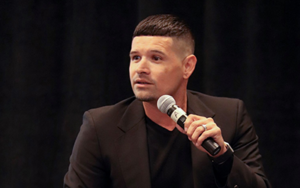“When you’re not given the historical context to understand why conditions are the way they are, young people are left out in the world wondering, ‘If it’s like this for people who look like me, there must be something wrong with us.’”
This episode of our podcast takes place against the backdrop of the 2019 Young Minds Matter (YMM) Conference, held by the Hogg Foundation, in Houston, TX. The theme for this year’s event was “Communities Connecting for Well-Being.” We converse with three unique and powerful voices from the conference: Marlon Lizama, a Houston spoken-word artist and co-founder of Iconoclast Artists; Dr. Howard Pinderhughes, chair of the Department of Social and Behavioral Science at the University of California San Francisco (UCSF); and Dr. Nia West-Bey, a senior policy analyst with the Center for Law and Social Policy (CLASP). In these conversations we converge on the central question: What does it truly mean to care about young minds?
Focusing on the Whole Child
The best way to get to know Marlon Lizama is directly through his art. The poem he performed at YMM, titled “Where I’m from”, covers some of the key themes of his work: community, origins, family, and immigrant stories. For Lizama, the phrase “community connections for well-being” signifies the importance of caring for “the whole child.” This means asking the question, “How else can we help you, besides giving you something to eat or offering you education?” For Lizama art, poetry, and travel have unlocked a view of the world that is unafraid and finds inspiration in other people and other cultures – something he was not able to experience growing up in an at-risk neighborhood and in a household that was focused on paying rent and making it to the next day.
Community Trauma and Structural Violence
Howard Pinderhughes grew up in the Roxbury neighborhood within the city of Boston, Massachusetts. He recalls watching the neighborhood decline from a vibrant community into poverty and violence–and losing friends to early death or incarceration along the way. After becoming a sociologist, Pinderhughes traveled across the country doing research on violence in different communities, and in doing so he saw patterns of violence and trauma that were systemic and institutional in nature. “We understood violence as bad things that were done by bad people who come from bad neighborhoods who have bad values,” Pinderhughes says, but he now believes that the concept of “community trauma” has helped reframe the discourse around violence that used to be dominated by a criminal justice frame, and that conversations will hopefully shift towards an understanding of the institutional and structural influences that create the conditions whereby violence is more likely to happen.
Is There Something Wrong with Us?
Our conversation with Nia West-Bey starts by unpacking a quote from her recent guest blog post for the Hogg Foundation, which came from a young person she spoke with in 2018: “Is like, everything alright with our people?” Connecting this question with the larger theme of historical and cultural trauma, West-Bey explains: “When young people aren’t given the language, don’t have the analysis – when our whole perspective is ahistorical – it puts young people in this position of turning to the community conditions they experience and looking back at themselves and saying, ‘Is there something wrong with me? Is there something wrong with my people?’” Without historical context to understand why conditions are the way they are, young people are left out in the world wondering if they themselves, their communities, and people who look like them are the source of the problem. The harms of being disconnected from history and historical erasure can also reveal the importance and the power that there is in giving young people the language to be able to talk about things like cultural and historical trauma. “Today’s cultural trauma is tomorrow’s historical trauma,” Dr. West-Bey states. “If not addressed and not properly resolved, a generation from now we’ll be looking at historical trauma from those cultural traumas.”
Past Trauma, Present Uncertainty, and Future Hope
Bringing these three guest’s perspectives together, we end up with a “working hypothesis” for moving forwards: For communities to connect for the well-being of young people, we must establish a venue for a meaningful conversation between past trauma, present uncertainty, and future hope. This is what truly being for well-being comes down to, and this is one thing that is implied by caring for young minds.
Related Content
- Young Minds Matter 2019
- Young Minds Matter: Historical and Cultural Trauma
- Episode 65: The Past Does Matter: A Look at Post-Traumatic Slave Syndrome
- Episode 36: Youth in Transition: From Support to Empowerment
Learn more about our podcast and check out other episodes!

